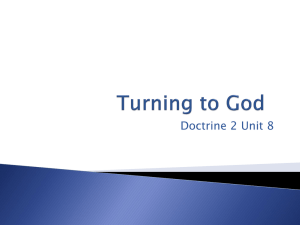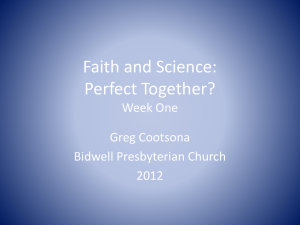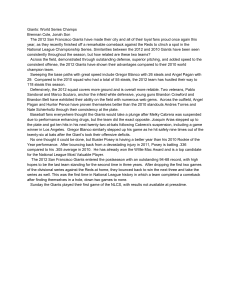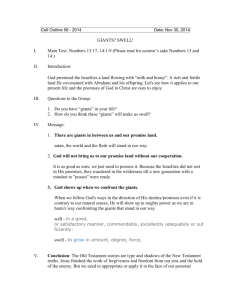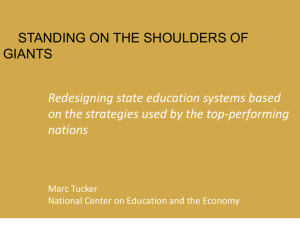The Shoulders of Giants Jeremiah 31:31
advertisement
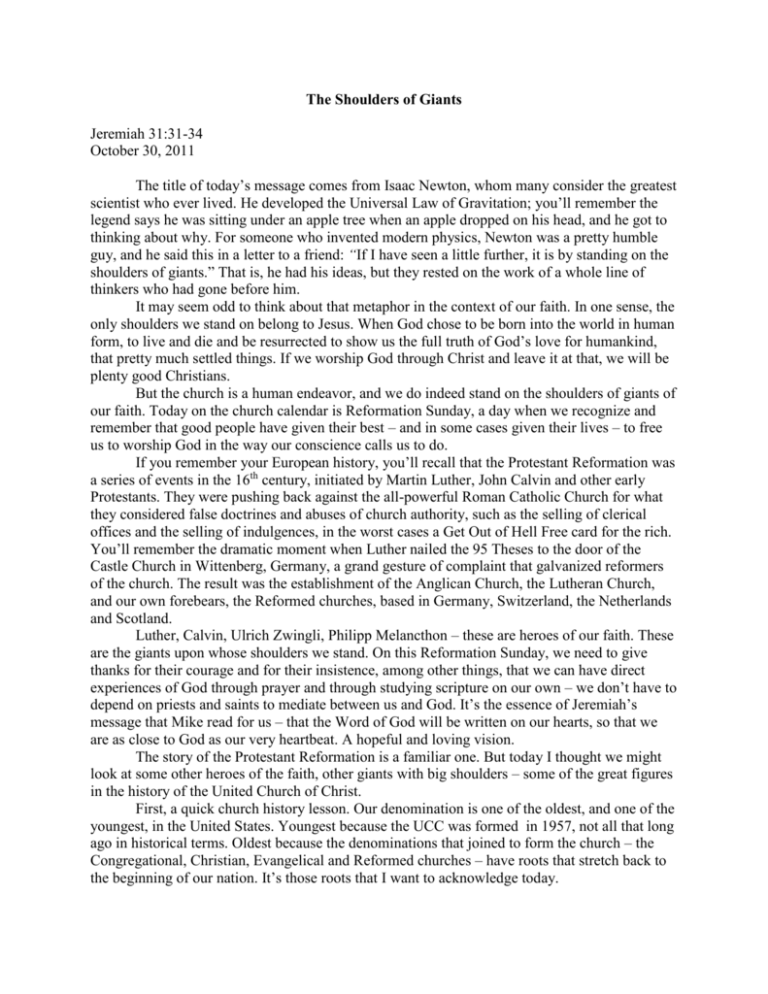
The Shoulders of Giants Jeremiah 31:31-34 October 30, 2011 The title of today’s message comes from Isaac Newton, whom many consider the greatest scientist who ever lived. He developed the Universal Law of Gravitation; you’ll remember the legend says he was sitting under an apple tree when an apple dropped on his head, and he got to thinking about why. For someone who invented modern physics, Newton was a pretty humble guy, and he said this in a letter to a friend: “If I have seen a little further, it is by standing on the shoulders of giants.” That is, he had his ideas, but they rested on the work of a whole line of thinkers who had gone before him. It may seem odd to think about that metaphor in the context of our faith. In one sense, the only shoulders we stand on belong to Jesus. When God chose to be born into the world in human form, to live and die and be resurrected to show us the full truth of God’s love for humankind, that pretty much settled things. If we worship God through Christ and leave it at that, we will be plenty good Christians. But the church is a human endeavor, and we do indeed stand on the shoulders of giants of our faith. Today on the church calendar is Reformation Sunday, a day when we recognize and remember that good people have given their best – and in some cases given their lives – to free us to worship God in the way our conscience calls us to do. If you remember your European history, you’ll recall that the Protestant Reformation was a series of events in the 16th century, initiated by Martin Luther, John Calvin and other early Protestants. They were pushing back against the all-powerful Roman Catholic Church for what they considered false doctrines and abuses of church authority, such as the selling of clerical offices and the selling of indulgences, in the worst cases a Get Out of Hell Free card for the rich. You’ll remember the dramatic moment when Luther nailed the 95 Theses to the door of the Castle Church in Wittenberg, Germany, a grand gesture of complaint that galvanized reformers of the church. The result was the establishment of the Anglican Church, the Lutheran Church, and our own forebears, the Reformed churches, based in Germany, Switzerland, the Netherlands and Scotland. Luther, Calvin, Ulrich Zwingli, Philipp Melancthon – these are heroes of our faith. These are the giants upon whose shoulders we stand. On this Reformation Sunday, we need to give thanks for their courage and for their insistence, among other things, that we can have direct experiences of God through prayer and through studying scripture on our own – we don’t have to depend on priests and saints to mediate between us and God. It’s the essence of Jeremiah’s message that Mike read for us – that the Word of God will be written on our hearts, so that we are as close to God as our very heartbeat. A hopeful and loving vision. The story of the Protestant Reformation is a familiar one. But today I thought we might look at some other heroes of the faith, other giants with big shoulders – some of the great figures in the history of the United Church of Christ. First, a quick church history lesson. Our denomination is one of the oldest, and one of the youngest, in the United States. Youngest because the UCC was formed in 1957, not all that long ago in historical terms. Oldest because the denominations that joined to form the church – the Congregational, Christian, Evangelical and Reformed churches – have roots that stretch back to the beginning of our nation. It’s those roots that I want to acknowledge today. So I’m going to give you just the barest capsule biographies of five of these heroes of the faith, and it’s my hope that their lives and their witness will do two things for us. One is that they’ll help us to recognize that we didn’t invent all you see around you, we inherited it from some visionary thinkers. The other is that these lives will inspire us to think more deeply about our own commitment to Christian discipleship, and to think about how we measure up, or don’t, to the faith that these people lived. First up is John Robinson, the “pastor to the Pilgrims.” The Pilgrims were extremists, really – a congregation in the wonderfully named English village of Scrooby, Nottinghamshire, that was dissatisfied with the pace of religious reforms in England, so they broke away from the Anglican church. They moved first to Holland – just up and left their hometown – and lived in Holland for a dozen years before finally deciding that they didn’t like the Dutch culture, and so about 35 members of the congregation boarded the Mayflower and set sail for Cape Cod in 1620. John Robinson, their pastor, didn’t sail with them; he stayed behind with the majority of the congregation. But he gave a famous farewell speech in which he spoke these words: “I charge you before God and his blessed angels that you follow me no further than you have seen me follow Christ. If God reveal anything to you by any other instrument of his, be as ready to receive it as you were to receive any truth from my ministry, for I am verily persuaded the Lord hath more truth and light yet to break forth from his holy word.” Or as we say it in the UCC today: God is still speaking. The title of the hymnal in the pew with you, Hymns of Truth and Light, comes from this farewell speech. Anne Hutchinson, our second hero of the faith, was a troublemaker in the newly settled colonies of the New World. Daughter of a non-conformist minister from north of London, Hutchinson was described as “a woman of haughty and fierce carriage [and] of voluble tongue,” and boy, she could use that tongue. She interrupted preachers with whom she disagreed, and she gathered women regularly in her own home – where she was busy raising 15 children, by the way – and preached to as many as 50 people at a time, sometimes even men. Hutchinson took issue with the idea that there was an “elect” group of people whom God had chosen to reach heaven, and she argued that anyone could experience a direct revelation from God – that the Bible was not the only way we can receive the truth of God. This stirred up all sorts of trouble, and finally there was a kangaroo trial and Anne Hutchinson and her family were banished from the Massachusetts Bay Colony; they ended up in Rhode Island. “The power of the Holy Spirit dwelleth perfectly in every believer,” Anne Hutchinson said, “and the inward revelations of her own spirit, and the conscious judgment of her own mind, are of authority paramount to any word of God.” In some churches today she would be banished all over again for saying that. A brave woman. Jonathan Edwards of Northampton, Mass., a Congregational minister, became part of the First Great Awakening, a religious revival that swept the Colonies from about 1720 to 1750. This was a movement that spoke to people’s emotional experience and brought them to Christ through tent revival meetings and music and all sorts of whooping and hollering. Edwards is famous for one revival sermon he preached, called “Sinners in the Hands of an Angry God,” a Scared Straight message if there ever was one. Here’s a line from that sermon: “The bow of God’s wrath is bent, and the arrow made ready on the string, and Justice bends the arrow at your heart, and strains the bow, and it is nothing but the mere pleasure of God, and that of an angry God, without any promise or obligation at all, that keeps the arrow one moment from being made drunk with your blood.” Wow, huh? And yet Edwards was much more about the perfection of Christ’s sacrifice for us. He was overwhelmed with the majesty and splendor of God, passionate about his faith. And he studied Isaac Newton and John Locke, St. Augustine and Plato, and integrated those ideas from science and philosophy into books of theology that are still studied today. Her family tried to dissuade her, and the Oberlin Theological School denied her the degree she had earned, but Antoinette Brown showed ’em all – she received a call to serve as pastor of the Congregational church in Butler, N.Y., up near Lake Ontario between Rochester and Syracuse, and in 1853 she was ordained there – the first woman in the United States to be ordained into Christian ministry. She didn’t serve long – she got married and later gave birth to seven daughters. But she was a fierce advocate for the abolition of slavery (she called it “malignantly aristocratic”), for temperance and abstinence from alcohol, and for the idea that the Bible shows women and men to be full equals. She wrote nine books, and in 1920, when she was 95 years old, she cast her first vote. By the time she died in 1921, there were 3,000 women ministers in the United States. “The sexes in each species of being,” she said, “are always true equivalents – equals but not identical.” And finally there is Reinhold Niebuhr, the most influential American theologian of the 20th century. Nurtured in the Evangelical Church – remember, one of the UCC’s four constituent denominations – Niebuhr became the champion of a theology called neo-orthodoxy that tried to reapply biblical teachings and truths to contemporary social problems, an attempt to counter the declining morality of the time. He taught at Union Theological Seminary in New York City, wrote a bunch of books, and spoke out as a public intellectual especially during the 1940s and ’50s, when he supported U.S. efforts to counter the spread of Communism around the world. He argued with both religious liberals and religious conservatives; he contributed greatly to thinking around when it is morally acceptable to enter into war, so-called “just war theory.” And all sorts of people – Jimmy Carter, Madeleine Albright, Hillary Clinton, John McCain and President Obama among them – have named Niebuhr as a formative influence on then. Oh, and he wrote the Serenity Prayer: “God grant me the serenity to accept the things I cannot change, courage to change the things I can change, and wisdom to know the difference.” These are extraordinary people, each of them. And what I hope we’ll take away today is the realization that the attributes that made them extraordinary – a good brain, courage, faith, a passion for God – these can be our attributes as well. We can develop these qualities in ourselves. We stand on the shoulders of giants, but we too can be giants. We too can bring our courage and our questions, our passion and our convictions, to the practice of our faith. As these lives show, it won’t always be easy, but God calls us to bring our whole selves to the task. Let’s not hold back. May it be so. Amen.





